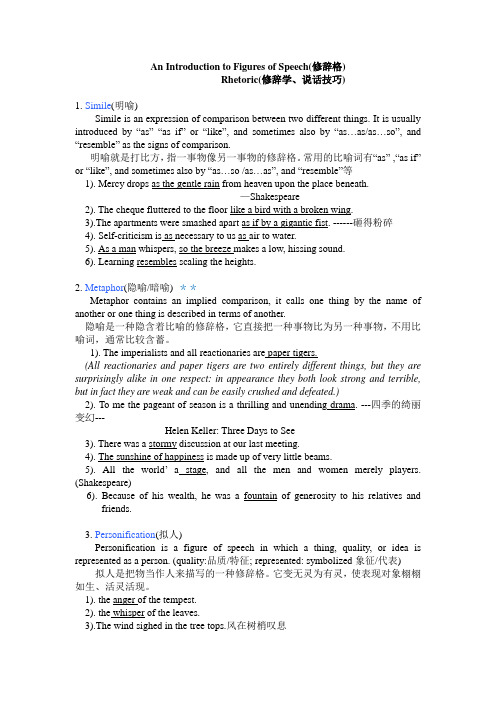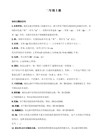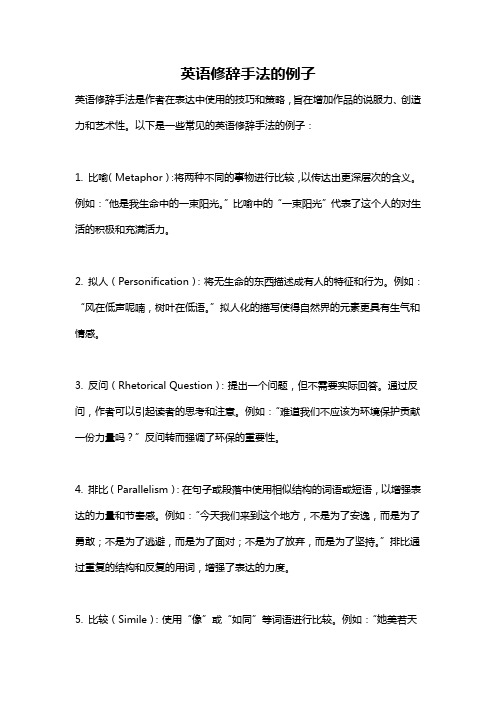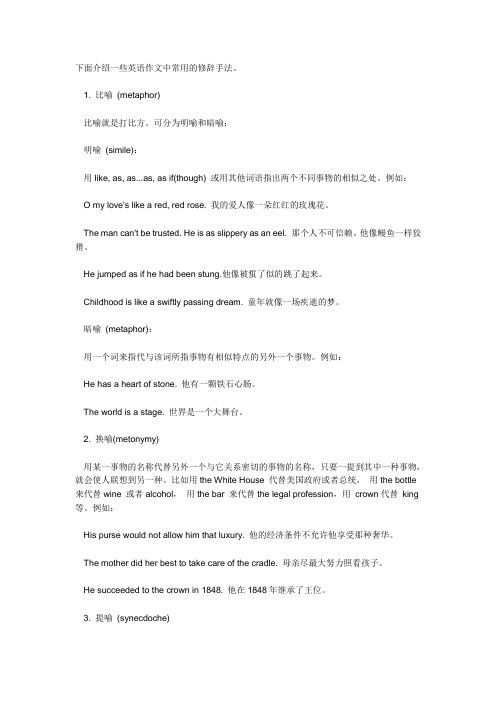英语修辞学例子
英语专业高级英语修辞介绍及例句

An Introduction to Figures of Speech(修辞格)Rhetoric(修辞学、说话技巧)1.Simile(明喻)Simile is an expression of comparison between two different things. It is usually introduced by “as”“as if”or “like”, and sometimes also by “as…as/as…so”, and “resemble” as the signs of comparison.明喻就是打比方,指一事物像另一事物的修辞格。
常用的比喻词有“as” ,“as if”or “like”, and sometimes also by “as…so /as…as”, and “resemble”等1). Mercy drops as the gentle rain from heaven upon the place beneath. —Shakespeare2). Thecheque fluttered to the floor like a bird with a broken wing.3).The apartments were smashed apart as if by a gigantic fist. ------砸得粉碎4). Self-criticism is as necessary to us as air to water.5). As a man whispers, so the breeze makes a low, hissing sound.6). Learning resembles scaling the heights.2. Metaphor(隐喻/暗喻)**Metaphor contains an implied comparison, it calls one thing by the name of another or one thing is described in terms of another.隐喻是一种隐含着比喻的修辞格,它直接把一种事物比为另一种事物,不用比喻词,通常比较含蓄。
英语学习:除了比喻拟人,常见的英语修辞你都会吗?

英语学习:除了比喻拟人,常见的英语修辞你都会吗?英语学习:除了比喻拟人,常见的英语修辞你都会吗?1.simile明喻A simile is a figure of speech in which two fundamentally unlike things are explicitly compared, usually in a phrase introduced by like or as.明喻是常用as或like等词将两种不同事物通过比较而连接起来的一种修辞手法。
让我们看几个例子:Good coffee is like friendship: rich and warm and strong.好的咖啡如同友谊,丰厚,温暖,热烈。
Life is rather like opening a tin of sardines. We're all of us looking for the key.人生就像一罐沙丁鱼,我们大家都在找开启的起子。
He was like a cock who thought the sun had risen from him to crow. 他这人就像一只骄傲的公鸡,以为太阳升起是为了它的啼叫。
2.metaphor暗喻A metaphor is a trope or figure of speech in which an implied comparison is made between two unlike things that actually have something in common.暗喻是将两种有共同点的不同事物进行隐晦比较的修辞手法。
明喻与暗喻的不同点就在于是否有出现like或者as(像)这一类比喻词,下面这几个句子都是暗喻:Humor is the shock absorber of life; it helps us take action.幽默是生活的减震器,它可以鼓舞人们付诸于行动。
英语修辞学中20种常见修辞格名称双语释义及举例

What does that lawyer do after he dies?——Lie still. 那个律师死后干什么?──躺着仍说鬼话。(注:lie躺, 撒谎;still安静地, 仍然)
E. oxymoron; zeugma ; contrast
Oxymoron(矛盾修辞法)与汉语中的反映辞格类似,都是将相互矛盾的概念和判断巧妙地联系在一起,以便相互映衬,突出事物的特点,表达复杂的思想感情和意味深长的哲理。矛盾修辞手法在英语中常见,但在汉语中很少见。如:sweet sorrow 忧喜参半 (不是甜蜜的悲伤); proud humility 不卑不亢(不是骄傲的谦卑)
这个项目从一开始就是一个摆脱不了的经济难题。(Albatross是英国诗人柯勒律治的《古舟子咏》中的信天翁,它被忘恩负义的水手杀死后,全船陷入灾难中。)
B. metonymy; transferred epithet Metonymy、synecdoche和_1antonomasia都是不直接说出事物的本来名称,而换用另一个名称或另一个说法。它们大体上相当于汉语的借代(分为旁借和对代两类)。如Crown(王冠)可喻指君主、王权、王国政府等;doll(玩具)可喻指姑娘、宝贝等。再如:
as thick as thieves亲密无间(不是"像贼一样厚")
as old as the hills古老 (不是"像山一样老")
The ship plows the sea. 船在乘风破浪地前进。(不是"船在犁海")
Allusion与汉语的暗引相近似。其特点是不注明来源和出处,一般多引用人们熟知的关键词或词组,将其融合编织在作者的话语中。引用的东西包括典故、谚语、成语、格言和俗语等。英语引用最多的是源出《圣经》故事以及希腊、罗马神话、《伊索寓言》和那些渊源流长的谚语、格言等。例如:
英语修辞手法的例子

英语修辞手法的例子英语修辞手法是作者在表达中使用的技巧和策略,旨在增加作品的说服力、创造力和艺术性。
以下是一些常见的英语修辞手法的例子:1. 比喻(Metaphor):将两种不同的事物进行比较,以传达出更深层次的含义。
例如:“他是我生命中的一束阳光。
”比喻中的“一束阳光”代表了这个人的对生活的积极和充满活力。
2. 拟人(Personification):将无生命的东西描述成有人的特征和行为。
例如:“风在低声呢喃,树叶在低语。
”拟人化的描写使得自然界的元素更具有生气和情感。
3. 反问(Rhetorical Question):提出一个问题,但不需要实际回答。
通过反问,作者可以引起读者的思考和注意。
例如:“难道我们不应该为环境保护贡献一份力量吗?”反问转而强调了环保的重要性。
4. 排比(Parallelism):在句子或段落中使用相似结构的词语或短语,以增强表达的力量和节奏感。
例如:“今天我们来到这个地方,不是为了安逸,而是为了勇敢;不是为了逃避,而是为了面对;不是为了放弃,而是为了坚持。
”排比通过重复的结构和反复的用词,增强了表达的力度。
5. 比较(Simile):使用“像”或“如同”等词语进行比较。
例如:“她美若天使,皮肤如同雪一般洁白。
”比较使得形容女性的美丽更为生动形象。
6. 倍数修饰(Hyperbole):通过夸张的表达来增强语气。
例如:“这个礼物是我有生以来收到的最棒的礼物!”通过夸大表达,强调了礼物的重要性和特别之处。
7. 对比(Contrast):通过对两个事物或概念进行对比,突显它们之间的差异和重要性。
例如:“黑暗中的孤独和明亮中的欢乐形成了鲜明的对比。
”对比使得表达更加鲜明,更能引起读者的共鸣。
8. 双关(Pun):使用同音异义词创造幽默效果。
例如:“时间如流沙,一去不复返。
”这里的“流沙”既有实际的流沙之意,也指的是时间的流逝,形成了幽默效果。
9. 借代(Metonymy):用代表整体的部分代替整体来表达意思。
常见的小学生英语作文修辞

常见的小学生英语作文修辞这篇文章里,我们就来谈一谈英文中常见的修辞手法。
1.simile明喻A simile is a figure of speech in which two fundamentally unlike things are explicitly compared, usually in a phrase introduced by like or as.明喻是常用as或like等词将两种不同事物通过比较而连接起来的一种修辞手法。
让我们看几个例子:Good coffee is like friendship: rich and warm and strong.好的咖啡如同友谊,丰厚,温暖,热烈。
Life is rather like opening a tin of sardines. We're all of us looking for the key.人生就像一罐沙丁鱼,我们大家都在找开启的起子。
He was like a cock who thought the sun had risen from him to crow.他这人就像一只骄傲的公鸡,以为太阳升起是为了它的啼叫。
2.metaphor暗喻A metaphor is a trope or figure of speech in which an implied comparison is made between two unlike things that actually have something in common.暗喻是将两种有共同点的不同事物进行隐晦比较的修辞手法。
明喻与暗喻的不同点就在于是否有出现like或者as(像)这一类比喻词,下面这几个句子都是暗喻:Humor is the shock absorber of life; it helps us take action.幽默是生活的减震器,它可以鼓舞人们付诸于行动。
英语修辞手法的例子

英语修辞手法的例子修辞手法是指通过巧妙运用语言的方式,增强表达的艺术效果。
在英语写作中,修辞手法是一种强大的工具,可以使文本更具吸引力、感染力和说服力。
以下是一些常用的英语修辞手法,并且配上了例子,以便更好地理解它们的运用。
1. 比喻(Metaphor):比喻是通过把一个事物比作另一个事物来传达意义和形象化情感的一种修辞手法。
比喻的目的是创造视觉和情感上的联想,使读者更好地理解和感受文本的意义。
例子:- Life is a journey. (人生如旅程)- His words were music to my ears. (他的话音如音乐般妙听)2. 拟人(Personification):拟人是指将无生命的事物赋予人类的特质、行为或意愿,以此增加描写的生动感和表达的深度。
例子:- The wind whispered through the trees. (风在树叶间低语)- The flowers danced in the breeze. (花在微风中跳舞)3. 对比(Contrast):对比通过将两个相反或不同的事物进行对比,以突出它们之间的差异和相互作用,增强文章的对比效果。
例子:- Love is both a rose and a thorn. (爱情既是玫瑰又是刺)- The sunset was a beautiful mix of vibrant colors against the dark horizon. (夕阳把鲜艳的色彩与黑暗的地平线形成了美丽的对比)4. 反复重复(Repetition):反复重复是通过在文章中反复使用相同的词语、短语或句子,以增加其强调和记忆力,使之更加令人难以忘怀。
例子:- Alone, alone, all, all alone, / Alone on a wide wide sea! (《古船上的人》里的反复重复)- I know, I know, I know. (我知道,我知道,我知道)5. 比较(Simile):比较是通过使用"like"或"as"来进行明确的比较,以便更好地理解和描绘事物的特点和属性。
英语中所有26种修辞手法的全部解释和例句

英语修辞手法总结Figures of speech (修辞)are ways of making our language figurative. When we use words in other than their ordinary or literal sense to lend force to an idea, to heighten effect, orto create suggestive imagery, we are said to be speaking or writing figuratively. Now we are going to talk about some common forms of figures of speech.1) Simile:(明喻)It is a figure of speech which makes a comparison between two unlike elements having at least one quality or characteristic (特性)in common. To make the comparison, words like as, as...as, as if and like are used to transfer the quality we associate with one to the other. For example, As cold waters to a thirsty soul, so is good news from a far country.2) Metaphor:(暗喻)It is like a simile, also makes a comparison between two unlike elements, but unlike a simile, this comparison is implied rather than stated. For example, the worldis a stage.3) Analogy: (类比)It is also a form of comparison, but unlike simile or metaphor which usually uses comparison on one point of resemblance, analogy draws a parallel between two unlike things that have several common qualities or points of resemblance.4) Personification: (拟人)It gives human form of feelings to animals, or life and personal attributes(赋予) to inanimate(无生命的) objects, or to ideas and abstractions(抽象). For example, the wind whistled through the trees.5) Hyperbole: (夸张) It is the deliberate use of overstatement or exaggeration to achieve emphasis. For instance, he almost died laughing.6) Understatement: (含蓄陈述) It is the opposite of hyperbole, or overstatement. Itachieves its effect of emphasizing a fact by deliberately(故意地) understating it,impressing the listener or the reader more by what is merely implied or left unsaid than by bare statement. For instance, It is no laughing matter.7) Euphemism: (委婉) It is the substitution of an agreeable or inoffensive(无冒犯) expression for one that may offend or suggest something unpleasant. For instance, we refer to "die" as " pass away".8) Metonymy (转喻)It is a figure of speech that has to do with the substitution of the mane of one thing for that of another. For instance, the pen (words) is mightier than the sword (forces).9) Synecdoche (提喻) It is involves the substitution of the part for the whole, or thewhole for the part. For instance, they say there's bread and work for all. She was dressedin silks.10) Antonomasia (换喻)It has also to do with substitution. It is not often mentioned now, though it is still in frequent use. For example, Solomon for a wise man. Daniel for a wise and fair judge. Judas for a traitor.11) Pun: (双关语) It is a play on words, or rather a play on the form and meaning of words. For instance, a cannon-ball took off his legs, so he laid down his arms. (Here "arms" has two meanings: a person's body; weapons carried by a soldier.)12) Syllepsis: (一语双叙) It has two connotations.In the first case, it is a figure by which a word, or a particular form or inflection of a word, refers to two or more words in the same sentence, while properly applying to or agreeing with only on of them in grammar or syntax(句法). For example, He addressed you and me, and desired us to follow him. (Here us is used to refer to you and me.)In the second case, it a word may refer to two or more words in the same sentence. For example, while he was fighting , and losing limb and mind, and dying, others stayed behind to pursue education and career. (Here to losing one's limbs in literal; to lose one's mindis figurative, and means to go mad.)13) Zeugma: (轭式搭配) It is a single word which is made to modify or to govern two or more words in the same sentence, wither properly applying in sense to only one of them, orapplying to them in different senses. For example, The sun shall not burn you by day, nor the moon by night. (Here noon is not strong enough to burn)14) Irony: (反语) It is a figure of speech that achieves emphasis by saying the opposite of what is meant, the intended meaning of the words being the opposite of their usual sense. For instance, we are lucky, what you said makes me feel real good.15) Innuendo: (暗讽) It is a mild form of irony, hinting in a rather roundabout (曲折)way at something disparaging(不一致) or uncomplimentary(不赞美) to the person or subject mentioned. For example, the weatherman said it would be worm. He must take his readings in a bathroom.16) Sarcasm: (讽刺) It Sarcasm is a strong form of irony. It attacks in a taunting and bitter manner, and its aim is to disparage, ridicule and wound the feelings of the subject attacked. For example, laws are like cobwebs, which may catch small flies, but let wasps break through.17) Paradox: (似非而是的隽语) It is a figure of speech consisting of a statement or proposition which on the face of it seems self-contradictory, absurd or contrary to established fact or practice, but which on further thinking and study may prove to be true, well-founded, and even to contain a succinct point. For example more haste, less speed.18) Oxymoron: (矛盾修饰) It is a compressed paradox, formed by the conjoining(结合) of two contrasting, contradictory or incongruous(不协调) terms as in bitter-sweet memories, orderly chaos(混乱) and proud humility(侮辱).19) Antithesis: (对照) It is the deliberate arrangement of contrasting words or ideas in balanced structural forms to achieve emphasis. For example, speech is silver; silence is golden.20) Epigram: (警句) It states a simple truth pithily(有利地) and pungently(强烈地). It is usually terse and arouses interest and surprise by its deep insight into certain aspects of human behavior or feeling. For instance, Few, save the poor, feel for the poor.21) Climax: (渐进) It is derived from the Greek word for "ladder" and implies the progression of thought at a uniform or almost uniform rate of significance or intensity,like the steps of a ladder ascending evenly. For example, I came, I saw, I conquered.22) Anti-climax or bathos: (突降)It is the opposite of Climax. It involves stating one's thoughts in a descending order of significance or intensity, from strong to weak, from weighty to light or frivolous. For instance, But thousands die, without or this or that, die, and endow(赋予) a college, or a cat.23) Apostrophe: (顿呼) In this figure of speech, a thing, place, idea or person (dead or absent) is addressed as if present, listening and understanding what is being said. For instance, England! awake! awake! awake!24) Transferred Epithet: (转类形容词) It is a figure of speech where an epithet (anadjective or descriptive phrase) is transferred from the noun it should rightly modify(修饰) to another to which it does not really apply or belong. For instance, I spent sleeplessnights on my project.25) Alliteration: (头韵) It has to do with the sound rather than the sense of words for effect. It is a device that repeats the same sound at frequent intervals(间隔) and since the sound repeated is usually the initial consonant sound, it is also called "front rhyme". For instance, the fair breeze blew, the white foam flew, the furrow followed free.26) Onomatopoeia: (拟声) It is a device that uses words which imitate the sounds made by an object (animate or inanimate), or which are associated with or suggestive(提示的) of some action or movementExplanation version1一、什么是修辞格修辞格(figures of speech)是提高语言表达效果的语言艺术。
40种英文修辞 中文版

下面介绍一些英语作文中常用的修辞手法。
1. 比喻(metaphor)比喻就是打比方。
可分为明喻和暗喻:明喻(simile):用like, as, as...as, as if(though) 或用其他词语指出两个不同事物的相似之处。
例如:O my love's like a red, red rose. 我的爱人像一朵红红的玫瑰花。
The man can't be trusted. He is as slippery as an eel. 那个人不可信赖。
他像鳗鱼一样狡猾。
He jumped as if he had been stung.他像被蜇了似的跳了起来。
Childhood is like a swiftly passing dream. 童年就像一场疾逝的梦。
暗喻(metaphor):用一个词来指代与该词所指事物有相似特点的另外一个事物。
例如:He has a heart of stone. 他有一颗铁石心肠。
The world is a stage. 世界是一个大舞台。
2. 换喻(metonymy)用某一事物的名称代替另外一个与它关系密切的事物的名称,只要一提到其中一种事物,就会使人联想到另一种。
比如用the White House 代替美国政府或者总统,用the bottle 来代替wine 或者alcohol,用the bar 来代替the legal profession,用crown代替king 等。
例如:His purse would not allow him that luxury. 他的经济条件不允许他享受那种奢华。
The mother did her best to take care of the cradle. 母亲尽最大努力照看孩子。
He succeeded to the crown in 1848. 他在1848年继承了王位。
3. 提喻(synecdoche)指用部分代表整体或者用整体代表部分,以特殊代表一般或者用一般代表特殊。
- 1、下载文档前请自行甄别文档内容的完整性,平台不提供额外的编辑、内容补充、找答案等附加服务。
- 2、"仅部分预览"的文档,不可在线预览部分如存在完整性等问题,可反馈申请退款(可完整预览的文档不适用该条件!)。
- 3、如文档侵犯您的权益,请联系客服反馈,我们会尽快为您处理(人工客服工作时间:9:00-18:30)。
1This elephant is like a snake as anybody can see. (simile)2He looked as if he had just stepped out of my book of fairytales and had passed me like a spirit. (simile)3It has long leaves that sway in the wind like slim fingers reaching to touch something. (simile)4He jumped back as if he had been stung, and the blood rushed sintoshis wrinkled face. (simile)5The cheque fluttered to the floor like a bird with a broken wing. (simile)6German guns and German planes rained down bombs, shells and bullets.(metaphor)7Nothing. No tracks but my own are stitched into the dusting of fresh snow, white as birch bark that fell during the night. No flittering shadows in the trees, not a sliver of bird song in the air. (metaphor)8Strawberries flooded the market and prices dropped down. (metaphor)9I suddenly came upon a wall of feeding elephants.(metaphor)10The diamond department was the heart and center of the store. (metaphor)11She may have tens of thousand of babies in one summer. (personification) 12... four evergreen shrubs stood at each corner, swheres they struggled to survivethe dust and fumes from a busy main road. (personification)13But the houses were cold, closed, unfriendly. (personification)14My only worry was that January would find me hunting for a job again.(personification)15My blood froze. (hyperbole)16When I told our father about this, his heart burst. (hyperbole)17My heart almost stopped beating when I heard my daughter’s voice on the phone.(hyperbole)18Vingo sat stunned, looking at the oak tree. It was covered with yellow handkerchiefs—20 of them, 30 of them, maybe hundreds. (hyperbole)19She gave me the impression of shavings more teeth, white and large and even, than were necessary for any practical purpose. (hyperbole)20We are none of us getting any younger. (understatement)21Last week I saw a woman flayed, and you will hardly believe how much it altered her person for the worse. (understatement)22…there was a loud cry from a number of voices, and the horses reared and plunged. But for the latter inconvenience, the carriage probably would not have stopped; carriages were often known to drive on, and leave their wounded behind, and why not? (understatement)23Those of us are quitting are the impatient ones who lack the imagination to believe that the bright dream will glow again. (understatement)24No one was more willing to do a favor for friend neighbor than he.(understatement)25The Great Wall was made not only of stones and earth, but of the flesh and blood of millions of men. (synecdoche)26He says that it was the most beautiful tongue in the world. (synecdoche)27Many eyes turned to a tall,20—year black girl on the U.S. team. (synecdoche)28Several years later, word came that Napoleonyh himself was coming to inspect them. (metonymy)29Al spoke with his eyes,“yes”. (metonymy)30So, during any five-week shape-up, focus more on the tape measure than on the bathroom scale. (metonymy)31Against the Oval Earth man, the first card I can play is the analogy of the sun and moon. (metonymy)32Senior citizens are respected in our country. (euphemism)33There are several pensioners in my school. (euphemism)34He has difficulty distinguishing between imaginary and factual information.(euphemism)35He needs help in learning to adhere to rules and standards of fair play.(euphemism)36Palestinian militants in the Gaza Strip bombarded the western Negev with dozens of Qassam rockets and mortar shells on Wednesday, burdening diplomatic efforts to revive a truce that expired over the weekend. (euphemism)37Rushing thongs, blinded by the darkness and smoke, rushed up on a street and down the next trampling the fallen in a crazy fruitless dash toward safety.(transferred epithet)38Sometimes they threw (him) bits of food, and got scant thanks; sometimes a mischievous pebble, and a shower of stones and abuses. (transferred epithet)39And the first tender singing of the passionate throat of a young collier, who has since drunk himself to death. (transferred epithet)40I suggest too that you avoid the big swamp in the southeast corner of the island.We call it Death Swamp. (transferred epithet)41Of the thousands of people who stand under Michelangelo’s heroic ceiling in the Sistine Chapel, very few are aware that they are looking a perhaps the greatest watercolor painting in the world. (transferred epithet)42It must be created by the blood and the work of all of us who believe in the future, who believe in man and his glorious man—made destiny. (parallelism)43... Because good technique in medicine and surgery means more quickly—curedpatients, less pain, less discomfort, less death, less disease and less deformity.(parallelism)44Napoleon was astonished. “Either you are mad, or I am,” He declared. “Both,sir!”cried the Swede proudly. (pun)45First gentleman: Thou art always figuring disease in me, but thou art full of error,I am sound. Lucio: Nay, not as one would say, healthy; but so sound as things thatare hollow; impiety has made a feast of thee. (pun)46Some books are to be tasted, others to be swallowed and some few to be chewed and digested. (synesthesia)07级英教(3)班常婷12007243601。
